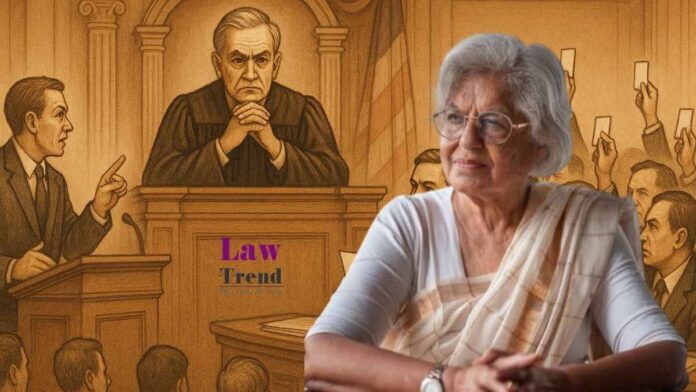New Delhi: In a candid and critical interview to Lallantop, Senior Advocate Indira Jaising has raised serious questions about the inner workings of the Indian judiciary, highlighting pressing issues ranging from the sexual harassment of women judges to a pervasive lack of transparency and accountability. Speaking on the YouTube channel ‘The Lallantop’, Jaising, known for her outspoken views, described the sexual harassment of female judges as the “dark secret of the judiciary,” and called for a more democratic and less hierarchical culture within the institution.
Background of the Interview
The interview, part of the ‘Kitabwala’ program, featured a discussion on the book “Incomplete Justice: The Supreme Court at 75,” edited by former Chief Justice of the Orissa High Court, Justice S. Muralidhar. The panel, which included Justice Muralidhar and Senior Advocate Raju Ramachandran, delved into a critical analysis of the Supreme Court and the challenges facing the Indian judicial system. It was in this context that Ms. Jaising made her powerful and startling revelations about the state of the judiciary.
Key Issues Raised by Indira Jaising
During the course of the interview, Ms. Jaising articulated several grave concerns about the functioning of the judiciary:
Sexual Harassment of Women Judges: Ms. Jaising made the explosive claim that the sexual harassment of women judges is a “very big issue” and a “dirty secret of the judiciary”. She revealed that she has personally handled four cases of women judges who were sexually harassed by High Court judges. She recounted a particularly shocking instance where a High Court judge allegedly asked a woman judge to perform a “Bollywood item number” at his wedding anniversary party. She argued that such harassment stems from the hierarchical power structure within the judiciary, where High Court judges control the careers of district judges, including their ACRs, promotions, and transfers, creating a culture of dependency and vulnerability.
Hierarchical and “Yes Sir” Culture: Jaising was sharply critical of the “haan ji, haan ji ka culture” that she says plagues the legal profession and the judiciary. This culture, she explained, discourages lawyers from challenging judges and fosters a relationship of subservience between the lower and higher judiciary, stifling dissent and honest discourse.
Lack of Accountability and Transparency in Judicial Transfers: Pointing to the arbitrary nature of judicial transfers, Ms. Jaising asserted that the “power of transfer” has become an “arbitrary power”. She lamented the lack of transparency in the collegium’s decisions, where judges are transferred without being given any reasons, violating the principles of natural justice.
Underrepresentation and Lack of Diversity: A significant concern for Ms. Jaising is the lack of diversity on the Bench. She pointed out that in the last 28 appointments to the Supreme Court, not a single woman was appointed, leaving only one woman judge in the apex court. She questioned the absence of adequate representation for Scheduled Castes, Scheduled Tribes, and other marginalized sections, arguing that the Supreme Court bench does not reflect the diversity of the Indian populace.
Selective Use of Contempt of Court Powers: Ms. Jaising highlighted the double standards in the application of contempt of court laws. She observed that “small people” are often hauled up for contempt, while powerful figures can make serious allegations against the judiciary with impunity. She cited the example of the Home Minister’s remarks against a former Supreme Court judge, which she termed a “very serious matter”.
The Need for ‘Scientific Temperament: Jaising concluded her remarks by emphasizing the importance of a “scientific temperament” within the judiciary, a principle enshrined in the Constitution. She expressed her wish that this spirit of rational and critical inquiry should not be lost from the judicial institution.
Disclaimer
The views and opinions expressed in this article are those of the individual speakers (Justice S. Muralidhar, Senior Advocate Indira Jaising, and Senior Advocate Raju Ramachandran) and do not necessarily reflect the official policy or position of “Law Trend” or its affiliates. This article is intended for informational and educational purposes only. The content provided is not legal advice, and viewers should not act upon this information without seeking professional counsel. Viewer discretion is advised.




